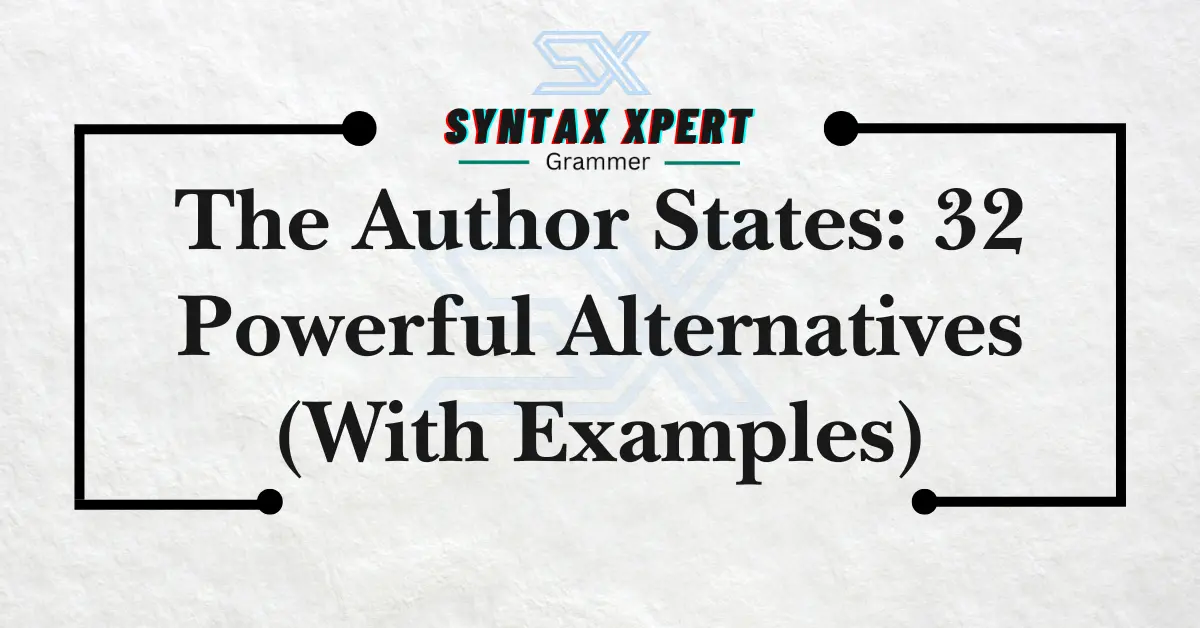The author states a point to convey key information in a literary work or academic writing. Whether you are working on a scholarly composition, research writing, or simply improving your English communication, using varied phrases can make your writing more engaging. Instead of repeating the same expression, opting for alternative language enhances meaningful communication and creates a significant exchange with your readers.
In academic discourse, using different terminologies helps to keep the text dynamic. By incorporating substitute expressions, writers can connect with an audience, engage readers, and relate to listeners. Below are 32 alternative phrases to replace “The author states,” each with an explanation and a sample email example demonstrating its use.
What Does “The Author States” Mean?
“The author states” means that a writer is expressing a fact, opinion, or argument in a clear and direct manner. This phrase is commonly used in academic writing, research papers, and literary analysis to introduce key points. It helps clarify the author’s perspective and supports effective dialogue in scholarly discussions.
When to Use “The Author States”
Use “The author states” when presenting an author’s claim, idea, or factual information from a book, article, or study. It is best suited for formal writing, academic discourse, and research summaries to maintain clarity. However, using varied phrases can improve readability and engage readers more effectively.
Other Words for The Author States
Here are 32 different ways to say “The Author States”:
- The author declares
- The author informs
- The author communicates
- The author articulates
- The author remarks
- The author notes
- The author asserts
- The author observes
- The author mentions
- The author expresses
- The author claims
- The author comments
- The author describes
- The author explains
- The author illustrates
- The author emphasizes
- The author highlights
- The author indicates
- The author points out
- The author conveys
- The author suggests
- The author demonstrates
- The author acknowledges
- The author argues
- The author implies
- The author presents
- The author reveals
- The author writes
- The author outlines
- The author portrays
- The author discusses
- The author reports
1. The Author Declares
Definition: The phrase “The author declares” emphasizes a strong statement or opinion, often found in research papers or scholarly articles. This term suggests certainty and conviction in the writer’s claim.
Using “declares” in educational text helps to present an argument forcefully, making it an excellent option for academic writing where persuasion is key.
Email Example:
Subject: Clarification on Research Findings
Hi Dr. Smith,
In the recent article on climate change, the author declares that the current policies are inadequate for mitigating global warming. Could you share your thoughts on this assertion?
Best,
Jason
2. The Author Informs
Definition: “The author informs” is a neutral and factual alternative used in academic discourse and research papers to present information without bias.
This phrase works well in educational reform discussions, as it implies the author communicates details rather than argues a point.
Email Example:
Subject: Summary of Article on Economic Disparity
Hi Emily,
The author informs readers about the effects of income disparity on mental well-being, linking financial stress to psychological well-being. Let me know if you need a summary.
Best,
Robert
3. The Author Communicates
Definition: “The author communicates” highlights how a writer delivers ideas effectively, making it ideal for discussions on digital media and social networks.
This phrase is particularly useful in articles about communication enhancement, impactful interaction, and effective dialogue.
Email Example:
Subject: Insights on Social Media Trends
Hi Mark,
The author communicates that modern online platforms shape public opinion through digital content consumption. Would love to discuss this further.
Regards,
Anna
4. The Author Articulates
Definition: Using “The author articulates” suggests that the writer expresses ideas with clarity, making it a strong choice for academic writing and substantial discourse.
This phrase is often found in scholarly articles and impactful alternatives to provide precise explanations.
Email Example:
Subject: Key Takeaways from Research Paper
Hi Sarah,
The author articulates the need for sustainable energy solutions to combat environmental change. Let’s discuss the implications of this research.
Thanks,
David
5. The Author Remarks
Definition: “The author remarks” suggests that a point was made in passing rather than as a central argument, making it useful for academic discourse and personal stories.
This phrase is often used when referring to experiential narratives or firsthand accounts that provide individual anecdotes.
Email Example:
Subject: Discussion on Remote Work Trends
Hi Linda,
The author remarks that telecommuting has led to increased work-life balance, though challenges remain. Let’s explore this further.
Regards,
Tom
6. The Author Notes
Definition: “The author notes” is a subtle way of indicating that the writer mentions a detail without heavily emphasizing it.
It is commonly used in academic writing when referring to supporting details rather than the main argument.
Email Example:
Subject: Discussion on Financial Crisis Impact
Hi George,
The author notes that economic disparity contributes to financial downturn, affecting low-income communities the most. Let’s analyze this further.
Regards,
Jennifer
Is It Professional to Say: The Author States?
Yes, “The author states” is a professional and widely accepted phrase in academic writing, research papers, and scholarly discourse. It clearly introduces an author’s argument or findings in a formal tone.
However, overusing it can make writing repetitive and monotonous. To create a more engaging scholarly composition, it’s beneficial to use alternative expressions like “The author asserts” or “The author explains”. Choosing the right phrase depends on context and intent, ensuring meaningful communication and effective dialogue.
Pros
- Clarity: It directly conveys the author’s point.
- Professionalism: It maintains a formal tone in academic writing.
Cons
- Repetitive: Overuse can make writing sound dull.
- Limited Variation: It may not fully capture nuance or emphasis.
Read More >>> I Understand Your Frustration: 13 Other Ways to Say It
Frequently Asked Questions
What is another way of saying the author states?
You can say “The author asserts,” “The author explains,” “The author conveys,” or “The author remarks.” These alternative phrases add variety and improve academic writing.
What’s another way to say the author says?
Try using “The author expresses,” “The author mentions,” “The author declares,” or “The author highlights.” These synonyms keep writing engaging and professional.
What’s another way of saying the text states?
Use “The text reveals,” “The text presents,” “The text discusses,” or “The text explains.” These variations make your writing clearer and more dynamic.
What should I say instead of states?
Instead of “states,” use “indicates,” “claims,” “describes,” “articulates,” or “observes.” These words ensure effective dialogue and substantial discourse.
Conclusion
Using varied phrases instead of “The author states” enhances academic writing and improves linguistic proficiency. By employing alternative expressions, writers can create a more engaging scholarly composition, ensuring their message resonates with readers, listeners, and viewers.
Whether discussing climate shift, economic disparity, or mental wellness, using different terminologies strengthens communication. These eloquent alternatives provide an opportunity to refine your writing style, helping to achieve meaningful communication and effective dialogue in any field of study.

I’m Luna Hazel, a grammar expert here to help you master the art of clear, confident writing. Let’s make every word count!

